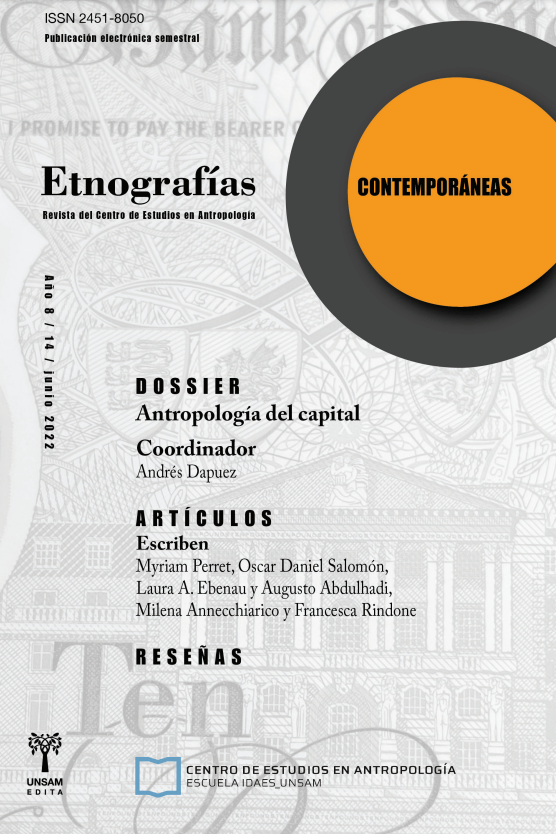Latin America and the People without Capital
Keywords:
Capital, Anthropology, Latin America, Marxism, EpistemologyAbstract
In this essay, I propose the identification and analysis of one of the major expressions of Euro-American xenophobia and racism, the socio-anthropological refusal to encounter and/or project the existence of capital in non-Western populations. Starting from a critical reading of Eric Wolf’s Europe and the People without History, and following some of its lines of exploration, I question a nostalgic episteme in the creation of a world without capital in the Euro-American periphery, specifically in Latin America. Without delving into the logics of the religious discourses that advocated for the recovery of paradise on earth, nor of the construction of the American indigenous people as anti-economic or, at least, anti-economic subjects, for example, those of Franciscan catechization, I attempt to recall that socio-cultural anthropology formed an important part of the colonial enterprise. As such, genealogical, critical, and epistemological analyses must be used to discern how anthropology helped to establish Latin American populations as mere objects of Political Economy in the popular doxa.
References
Asad, Talal (1973). Editor. Anthropology and the Colonial Encounter. London, Ithaca Press.
Appadurai, Arjun (2017). Hacer negocios con palabras: El fracaso del lenguaje como clave para entender el capitalismo financiero. Buenos Aires, Siglo XXI.
Bachelard, Gaston (1988) La formación del espíritu científico. Contribución a un psicoanálisis del conocimiento objetivo. México, Siglo XXI
Bataille, George (1987). La parte maldita precedida de la noción de gasto. Barcelona, Icaria.
Beckert, Sven (2015). Empire of Cotton. A Global History y Slavery Capitalism. New York, Vintage Books.
Beckert, Sven and Rockman, Seth (2016). Editors. A New History of American Economic Development. Philadelphia, University of Pennsylvania Press.
Becker, Gary (1964). Human Capital: A Theoretical and Empirical Analysis, with Special Reference to Education. Chicago, The University of Chicago Press.
Bourdieu, Pierre (2013). La Nobleza del estado, Los poderes y su reproducción. México DF, Siglo XXI.
Butler, Judith (1997). Excitable Speech: A Politics of the Performative. New York, Routledge
Castellanos, Bianet (2010). A return to servitude. Maya migration and the tourist trade in Cancún. Mineapolis, University of Minnesota Press.
Dapuez, Andrés (2021). Dinero-capital de la Asignación Universal por Hijo para la Protección Social en un barrio marginal de la ciudad de Paraná, Argentina. Revista Colombiana de Antropología, 57(1): 99-124.
Durand, Jorge (2016). Historia mínima de la migración México-Estados Unidos. Ciudad de México, El Colegio de México
Guyer, Jane (1997). “Endowments and Assets: The Anthropology of Wealth and the Economics of Intrahousehold Allocation”. En: Lawrence Haddad, John Hoddinott and Harold Alderman (Editors), Intrahousehold Resource Allocation in Developing Countries. Models, Methods and Policy. Baltimore. INFRI and Johns Hopkins University Press.
Keynes, John Maynard (1936). The General Theory of Employment, Interest and Money. Cambridge,Cambridge University Press.
Mauss, Marcel (2009 [1925]). Ensayo sobre el don: Forma y Función del intercambio en las Sociedades Arcaicas. Buenos Aires, Katz Editores.
Mintz, Sidney (1986). Sweetness and Power. The Place of Sugar in Modern History. New York, Penguin.
New York Times (2018). What Jair Bolsonaro’s Victory Could Mean for the Amazon, and the Planet. Documento electrónico: (https://www.nytimes.com/2018/10/17/climate/brazil-election-amazon-environment.html), acceso 19 de diciembre de 2018.
Nugent, Stephen L. (2018). The Rise and Fall of Amazon Rubber Industry. An Historical Anthropology. Abingdom, UK, Roudledge.
Polanyi, Karl (1944). The Great Transformation. New York, Farrar & Rinehart.
Wolf, Eric (1987). Europa y la Gente sin Historia. México DF, Fondo de Cultura Económica.
























